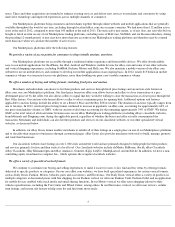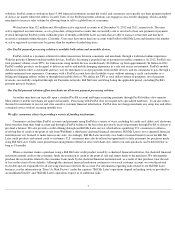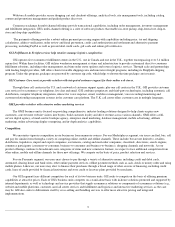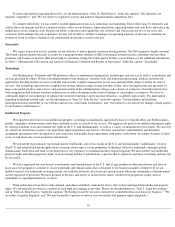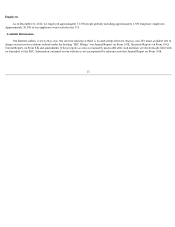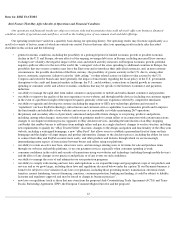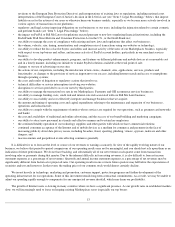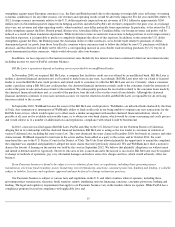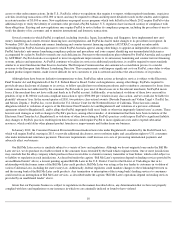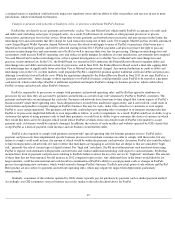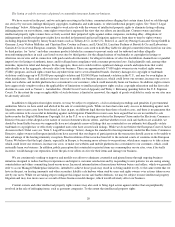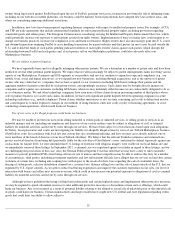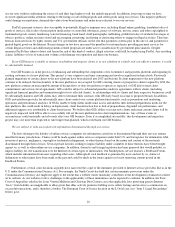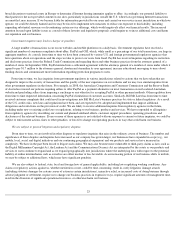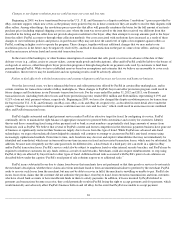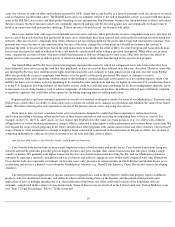eBay 2012 Annual Report Download - page 17
Download and view the complete annual report
Please find page 17 of the 2012 eBay annual report below. You can navigate through the pages in the report by either clicking on the pages listed below, or by using the keyword search tool below to find specific information within the annual report.
strengthens against major European currencies (e.g., the Euro and British pound) due to the ongoing sovereign debt crisis in Europe, worsening
economic conditions or for any other reasons, our revenues and operating results would be adversely impacted. For the year ended December 31,
2012, foreign currency movements relative to the U.S. dollar negatively impacted our net revenues of $14.1 billion by approximately $206
million (net of a $44 million positive impact from hedging activities included in PayPal's net revenue) compared to the prior year. As exchange
rates vary, net revenues and other operating results, when translated, may differ materially from expectations. In particular, to the extent the U.S.
dollar strengthens against the Euro, British pound, Korean won, Australian dollar or Canadian dollar, our foreign revenues and profits will be
reduced as a result of these translation adjustments. While from time to time we enter into transactions to hedge portions of our foreign currency
translation exposure, it is impossible to predict or completely eliminate the effects of this exposure. In addition, to the extent the U.S. dollar
strengthens against the Euro, the British pound, the Australian dollar or other currencies, cross-border trade related to purchases of dollar-
denominated goods (or goods from those Asia-Pacific countries whose currencies tend to follow the dollar) by non-U.S. purchasers will likely
decrease, and that decrease will likely not be offset by a corresponding increase in cross-border trade involving purchases by U.S. buyers of
goods denominated in other currencies, which would adversely affect our business.
In addition, we face exposure to fluctuations in interest rates. Relatively low interest rates have continued to limit our investment income,
including income we earn on PayPal customer balances.
Bill Me Later's operations depend on lending services provided by an unaffiliated lender.
In November 2008, we acquired Bill Me Later, a company that facilitates credit services offered by an unaffiliated bank. Bill Me Later is
neither a chartered financial institution nor is it licensed to make loans in any state. Accordingly, Bill Me Later must rely on a bank or licensed
lender to issue the Bill Me Later credit products and extend credit to customers to offer the Bill Me Later service. Currently, when a consumer
makes a purchase using a Bill Me Later credit product, the chartered financial institution extends credit to the consumer, funds the extension of
credit at the point of sale and advances funds to the merchant. We subsequently purchase the receivables related to the consumer loans made by
the chartered financial institution and, as a result of the purchase, bear the risk of loss in the event of loan defaults. Although the chartered
financial institution continues to own each customer account, we own the related receivable and Bill Me Later is responsible for all servicing
functions related to the account.
In September 2010, WebBank became the issuer of the Bill Me Later credit products. WebBank is an industrial bank chartered by the State
of Utah. Any termination or interruption of WebBank's ability to lend could result in our being unable to originate any new transactions for the
Bill Me Later service, which would require us to either reach a similar arrangement with another chartered financial institution, which, if
possible at all, may not be available on favorable terms, or to obtain our own bank charter, which would be a time-consuming and costly process
and would subject us to a number of additional laws and regulations, compliance with which would be burdensome.
In 2010, a lawsuit was filed against Bill Me Later, PayPal and eBay in the U.S. District Court for the Northern District of California,
alleging that in its relationship with the chartered financial institution, Bill Me Later is acting as the true lender to customers in violation of
various California laws, including the state's usury law. The court dismissed the usury claims in December 2010, but breach of contract and other
claims remain. WebBank requested to intervene in the action and has been added as a party to the action, and in October 2011, the court
transferred the case to the U.S. District Court for the District of Utah. The Utah Court allowed plaintiffs the opportunity to amend the complaint;
the complaint was amended and plaintiffs re-alleged the usury claims that were previously dismissed. We and WebBank have filed a motion to
dismiss the lawsuit. A hearing on the motion was held by the court in September 2012. We believe that plaintiffs' allegations are without merit
and intend to defend ourselves vigorously. However, this area of law is uncertain and if the lawsuit is successful, Bill Me Later may be required
to change its methods of operations, pay very substantial damages and reduce some of its charges and fees, which would adversely affect our
business.
If our Payments business is found to be subject to or in violation of any laws or regulations, including those governing money
transmission, electronic funds transfers, money laundering, terrorist financing, sanctions, consumer protection, banking and lending, it could be
subject to liability, licensure and regulatory approval and may be forced to change its business practices.
Our Payments business is subject to various laws and regulations in the U.S. and other countries where it operates, including those
governing money transmission, electronic funds transfers, money laundering, terrorist financing, sanctions, consumer protection, banking and
lending. The legal and regulatory requirements that apply to our Payments business vary in the markets where we operate. While PayPal has a
compliance program focused on compliance with applicable laws and
15


